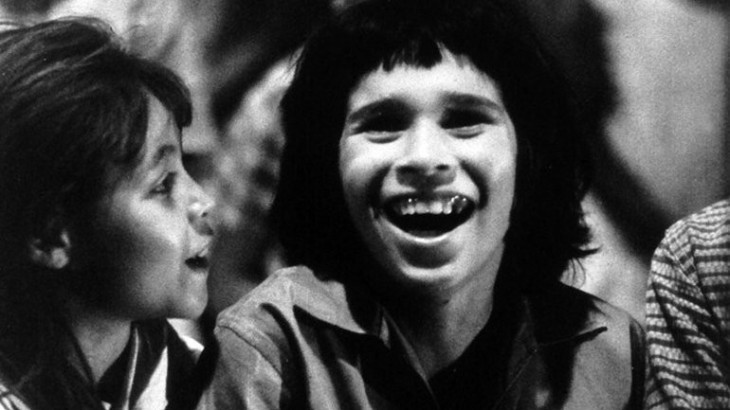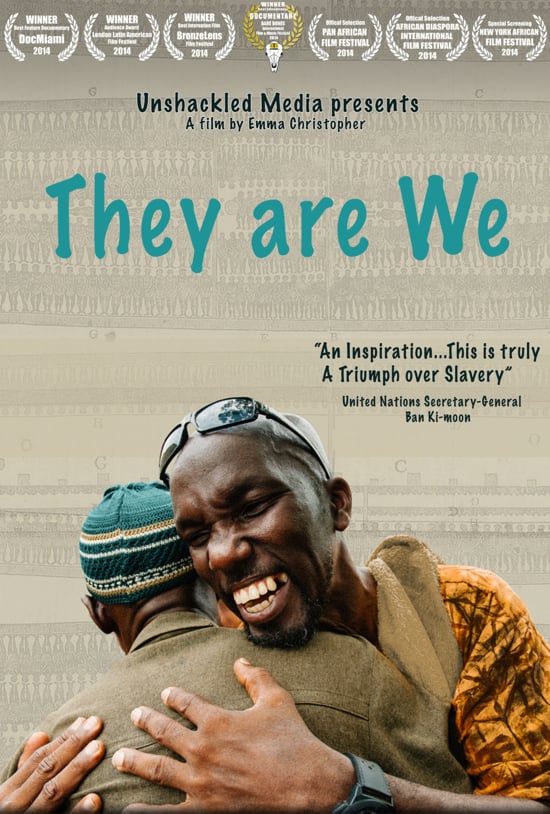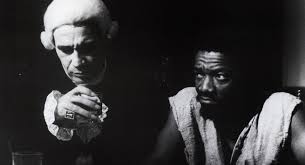
Here is our #CuarenCineCuba eclectic selection of 10 films – fiction and documentaries from and about Cuba to watch from home:
1. ‘Por Primera Vez’ (‘For the First Time’) Dir. Octavio Cortazar, 1967, Cuba, 9 mins. English subtitles.
It chronicles one day in 1967 in the village of Los Munos, in the Baracoa municipality of Cuba, where a mobile cinema truck shows the villagers moving pictures for the first time. The entire film was shot on April 12, 1967 in the village itself, and shows the cinema truck travelling to the village, as well as interviews with both the projectionists and several villagers. The film shown was the Chaplin feature, Modern Times, on a portable 16 mm projector in the back of the truck. As it happens, the film screening is well received.
Watch POR PRIMERA VEZ on Vimeo (register then watch for free)
2. NOW – Santiago Alvarez, 1965, Cuba, 5 mins B&W
A short documentary about racism in the United States, with the music of Lena Horne.
Featuring stock newsreel footage and a handful of still photographs brought to dynamic life by Álvarez’ signature editing style, Now‘s compelling vision of racial violence at the hands of American police officers and the hypocrisy inherent within the American system plays out with no synch sound or voiceover commentary. Instead, the piece seems to dance along to the tune of Lena Horne‘s incendiary “Now”– a song that was banned from U.S. airwaves for its unabashed call to open revolt — with jarring cuts and a powerful succession of images that build in crescendo along with the music.
3. Documentary: History through Cuban Eyes: Noticiero ICAIC (14 mins)
This is a story of history recorded on film; a history of revolutionary Cuba; a history of the world seen through Cuban eyes. ‘Noticiero ICAIC Latinoamericano’ was a series of cinematic newsreels produced from 1960 to 1990 by the Cuban film Institute ICAIC. The weekly news programme, covering major local and global events, would be shown before film screenings in the capital, Havana, and in towns and villages around the island.
For a short interview with Cuban media historian Mayra Alvarez, about the archive of the ICAIC newsreels and their legacy
4. For a fascinating lesson on the importance and meaning of Memories of Underdevelopment – a talk by Criterion Channel
Memories of Underdevelopment – This film by Tomás Gutiérrez Alea is the most renowned work in the history of Cuban cinema. After his wife and family flee in the wake of the Bay of Pigs invasion, the bourgeois intellectual Sergio (Sergio Corrieri) passes his days wandering Havana in idle reflection, his amorous entanglements and political ambivalence gradually giving way to a mounting sense of alienation. With this adaptation of an innovative novel by Edmundo Desnoes, Gutiérrez Alea developed a cinematic style as radical as the times he was chronicling, creating a collage of vivid impressions through the use of experimental editing techniques, archival material, and spontaneously shot street scenes. Intimate and densely layered, MEMORIES OF UNDERDEVELOPMENT provides an indictment of its protagonist’s disengagement and an extraordinary glimpse of life in postrevolutionary Cuba.
Watch a short trailer of the original film here on youtube
5. Maestra (‘Schoolteacher’) Documentary by Catherine Murphy, 2012, 33 minutes
In 1961, over 250,000 Cubans joined their country’s National Literacy Campaign and taught more than 707,000 other Cubans to read and write. Almost half of these volunteer teachers were under 18. More than half were women. Narrated by Pulitzer Prize winning author Alice Walker, MAESTRA (Spanish for teacher) explores the experiences of nine of the women who, as young girls, helped eradicate Cuban illiteracy within one year. Interweaving recent interviews, archival footage, and campaign photos, this lively documentary includes one of the first Cubans of her generation to call herself a feminist and one of the first openly proud members of Cuba’s LGBT community. With wit and spirit, all recall negotiating for autonomy and independence in a culture still bound by patriarchal structures.
Watch on Vimeo (register and pay to watch):
Watch the trailer here
6. They are We by Dir. Emma Christopher 2015, documentary.
Can a family separated by the transatlantic slave trade sing and dance its way back together? In Perico, Cuba is an Afro-Cuban group that has kept alive songs and dances brought aboard a slave ship by their ancestor, known only as Josefa. They preserved them proudly despite slavery, poverty and repression. Through years of searching, filmmaker Emma Christopher tried to find their origins. Then, in a remote village in Sierra Leone, people watched a recording of the Cubans’ songs and dances, joyously declared ‘They are We!’ and joined in with the songs. They had never forgotten their lost family, and now their descendants were coming home.
Watch on Vimeo (register and pay to view): https://vimeo.com/ondemand/theyarewe

7. The Last Supper/La Ultima Cena, 1976, Dir.Tomas Gutierrez Alea, Cuba,120mins. with English subtitles
The classic Cuban film tells the story of a pious Havana plantation owner in the 1790s, during Cuba’s Spanish colonial period. The plantation owner decides to recreate the Biblical Last Supper using twelve of the slaves working in his sugarcane fields, hoping to thus teach the slaves about Christianity.
In a misguided attempt to enlighten his African-originating slaves, a Count invites twelve of them to a dinner on Maundy Thursday in a re-enactment of the Last Supper with himself as Christ. Whilst they eat and drink, he also feeds them religious rhetoric and attempts to instruct them in the workings of Christianity. He promises them a day off for the following Good Friday and commits to freeing one of the slaves. However, when these promises are not held up the next day, the slaves rebel. The slaves are then hunted down and killed by their master, except one who escapes.
Watch for free on youtube here

8. Cuba and the Cameraman Documentary by Jon Alpert, 2017, Cuba/US.
For the past 42 years Director Jon Alpert has been following Fidel Castro and three Cuban families affected by his policies. Their lives put us right in the roller coaster of the Cuban Revolution. Because of Alpert’s unique access to the island, and the trust and friendships earned over decades, this film is a candid and revealing never-before-seen portrait of Cuba.
Watch on Netflix or online for free here
Watch the trailer on youtube
9. Black and Cuba Dir. Dr Robin J Hayes, US/Cuba
This award-winning documentary follows street-smart Ivy League students who are outcasts at their elite university, band together and adventure to the enigmatic Caribbean island of Cuba, whose population is 60% Black. Their journey through the streets of Havana and Santiago reveals enthralling scenes of Cuban life including hip hop performances, block parties, and candid spontaneous encounters with AfroCuban youth. As they film their experience, the travelers discover connections between Cuban and American perspectives on human rights, race, and revolution.
Watch on Vimeo (register and pay to view) here
Watch the trailer on youtube here
10. Yuli The Carlos Acosta Story
Directed by Icíar Bollaín, Written by Paul Laverty
The award-winning film follows Carlos Acosta – nicknamed Yuli by his father – from growing up on the streets of his native Cuba, through his time at the country’s National Dance School, to performing at London’s prestigious Royal Ballet. Based on his 2007 UK bestseller autobiography No Way Home.
Watch the trailer here

You must be logged in to post a comment.